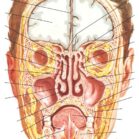Root Canal
Updated February 12, 2022
 A root canal is a procedure where a specialized dentist, an endodontist, cleans out the nerve canals of an infected/dying tooth, avoiding extraction. The tooth then is dead, acting similarly to an implant. After the canals are cleaned out, medication is instilled into the canals and then the tooth is capped.
A root canal is a procedure where a specialized dentist, an endodontist, cleans out the nerve canals of an infected/dying tooth, avoiding extraction. The tooth then is dead, acting similarly to an implant. After the canals are cleaned out, medication is instilled into the canals and then the tooth is capped.
While this has been a standard procedure for decades, numerous dentists beginning with Hal Huggins raised serious concerns about the long-term safety of the procedure. Unfortunately, unlike a modern implant the dead tooth contains miles of microscopic canals which eventually become populated with bacteria, yeast and other critters. These critters make toxins that can then affect the health of the entire body. There are cases of people with chronic illness stemming from one bad root canal; upon extraction of the tooth health vastly improved. Therefore in holistic medicine, root-canals are strongly discouraged, and when possible, removed.
The question becomes what to do with an infected tooth? In both the case of an abscess and an old root canal, the concern is that the teeth are close to the brain and infection can spread. So there are three choices: heal the infection (if possible), root canal, or extract the tooth. Whether an infection at a late stage can be healed remains a controversial question and can only be addressed with the evaluation of a knowledgeable practitioner.

Thomas Levy MD, a cardiologist, lawyer and vitamin C champion worked with Huggins for years and co-wrote a book with him that is available on Amazon (link here, new tab, may not work). The connection between gum/mouth disease and the heart is now well-established. Oral infections can spread through the bloodstream not only affecting the blood vessels and heart but potentially every organ.
This page is under development. Working links will provide starting information. Please let us know about your interest in this page by emailing us here, and check back soon.
Related Links
Skull Medicine
Toothache
Gum Disease



